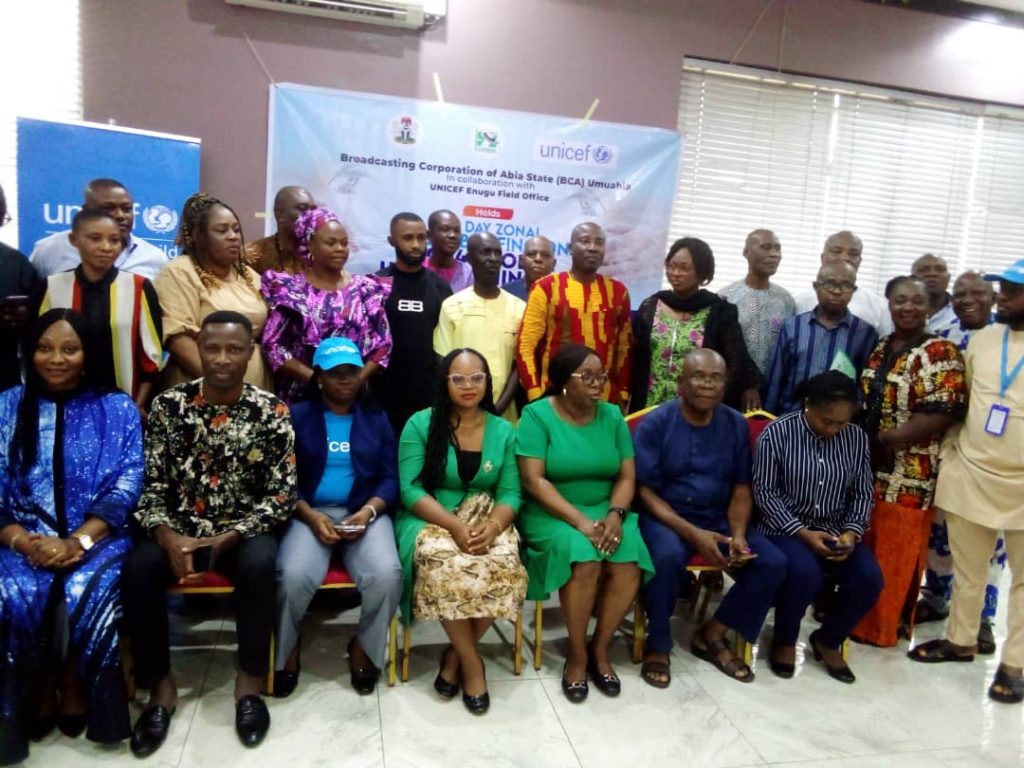Ben Ezechime, Enugu
As the World marks the 2024 Global Hand-washing day, Stakeholders in the South-East zone of Nigeria have suggested renewed efforts to improve the habit to reduce diseases associated with hand-washing.
The resolution was taken at a one-day zonal press briefing on Global Hand-washing day 2024 held in Enugu.
The briefing was organised by the UNICEF in conjunction with the Broadcast Corporation of Abia State (BCA) and the Enugu State Government.
The theme of this year’s event is: “Why is hand-washing still important?”
In her goodwill message, Mrs Maureen Zubi-Okolo, Specialist, Planning and Monitoring, UNICEF Field Office Enugu, said that good hand hygiene remains a cornerstone for safe and effective health care.
She said that good hand-washing is a highly cost-effective public health measure crucial to the protection against a range of diseases like pneumonia, cholera and diarrhea among others.
According to her: “Greater political support and behaviour change interventions are needed to make substantial improvements in the policies, strategies and actions that drive sustainable change.”
Zubi-Okolo noted that more than 2.3 billion people across the world do not have a hand-washing facility with water and soap at home.
“Almost half of the schools lack a hand-washing facility with water and soap, affecting some 802 million school-age children globally,” she said.
The UNICEF specialist said that the organisation had supported hand hygiene initiatives to combat some of the worst global epidemics, including ebola and cholera, for many years.
“Since the emergence of the global COVID-19 pandemic, UNICEF has scaled up hand hygiene efforts in various countries and regions through the Hand Hygiene for All Initiative.
“This sets ambitious targets for expanding access to hand hygiene in schools, health-care facilities, workspaces, displacement camps and other key areas of public interest.
“Our global coordination with partners will help ensure countries hold on to the gains made in hand hygiene beyond the pandemic,” she said.
In her keynote address, Mrs Rebecca Gabriel, Wash Specialist, UNICEF Field Office Enugu, said that the hand-washing day was a global advocacy day dedicated to increasing awareness about the importance of hand hygiene and triggering lasting change from the policy-level to community-driven action.
Gabriel said that the day served as an opportunity to design, test, and replicate creative ways to encourage people to wash their hands at critical times.
According to her, while significant progress in hand hygiene awareness has been made, maintaining and improving hand hygiene behaviors remained crucial beyond public health emergencies, including the COVID-19 pandemic.
“Clean hands remain a fundamental defense against the spread of infections, illnesses, and harmful germs.
“Whether in hospitals, schools, or in everyday interactions, practicing hand-washing with soap contributes to better health outcomes and a safer world for everyone,” she said.
She said that it was the collective efforts of everyone including governments, businesses, the academia to encourage hand-washing for a saner society.
“It is our collective responsibility to safeguard public health, prevent infections, enhance dignity and promote wellbeing.
“The benefits of clean hands Hand hygiene, whether through handwashing with soap or alcohol-based hand rub, can help reduce the transmission of a range of diseases:
“Hand-washing with soap can reduce diarrheal diseases by 30%. Hand-washing with soap can reduce acute respiratory infections by up to 20%.
“Hand-washing with soap plays an important role in reducing the transmission of outbreak-related pathogens such as cholera, Ebola, shigellosis, SARS, hepatitis E, COVID-19, and monkeypox.
“Hand hygiene is protective against healthcare-associated infections and contributes to reducing the spread of antimicrobial resistance. Hand hygiene may contribute to the reduction of Neglected Tropical Diseases,” she said.
She said that promoting hand hygiene was crucial for both businesses and suppliers.
“For governments and businesses, effective hand hygiene practices can significantly reduce the spread of infectious diseases, leading to fewer employee sick days and increased productivity.”
She said that for effective implementation of hand hygiene practices, businesses should install and maintain handwashing stations in key areas – near toilets, in the kitchen, and in other shared office spaces.
Speaking, the acting Managing Director of Enugu State Rural Water and Sanitation Agency (ENRUWASA), Ms Chika Mbah, represented by Mrs Chioma Emmanuel said that the State government was doing much in the area of providing clean water across the state.
She revealed that more than one hundred boreholes project were ongoing across the state by the state government with the view to providing safe and clean water for the people.
“The government of Enugu State is doing so much to provide safe and clean water across the 17 local government areas of the state,” she said.

